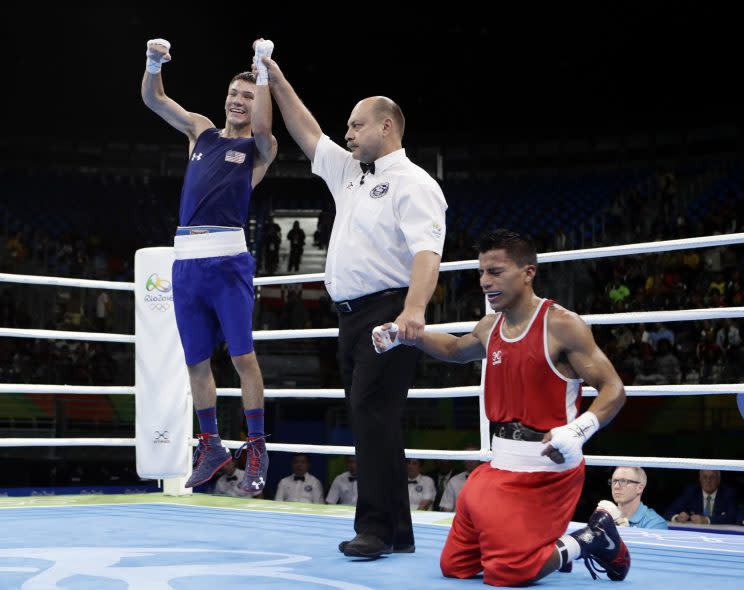USA Boxing's Olympic medal drought is over

RIO DE JANEIRO — Nico Hernandez is quiet and soft-spoken, but he made a big statement Wednesday for amateur boxing in the United States.
Hernandez outpointed Carlos Eduardo Quipo Pilataxi of Ecuador on all three cards to advance to the semifinals of the Olympic light flyweight tournament and guarantee himself at least a bronze medal.
He’ll fight Hasanboy Dusmatov of Uzbekistan on Friday in the semifinals with a chance to improve that medal to at least a silver. That, though, isn’t what the 19-year-old from Wichita, Kansas, has in mind.
“I came here to get a gold medal and so I won’t be satisfied until I get the gold,” said Hernandez, whose medal, whatever it may turn out to be, will be the first won by an American male in boxing since Deontay Wilder took bronze in Beijing in 2008.
Hernandez’s win is clearly a big boon for USA Boxing, whose men’s program has been on a decline ever since the star-laden 1988 team won three golds, three silvers and two bronzes. That team includes two men already enshrined in the International Boxing Hall of Fame, Michael Carbajal and Riddick Bowe, and another who will be once he retires, the legendary Roy Jones Jr.
[Related: Meet the American-born basketball nomad who coaches Nigeria]
After winning just one bronze in 2008 and no medals at all in 2012, USA Boxing underwent massive internal changes. The most prominent move was the hiring of Billy Walsh, who had been coaching Ireland.
The U.S. gave him a five-year contract and a mandate to turn things around. He’s said repeatedly he thinks his program won’t be fully implemented until 2020, but he was like a proud father moments after Hernandez’s win.
“For me, it’s my first medal with the United States, so it means a lot to me personally,” Walsh said. “I won seven with Ireland and that’s my first one with a different country, so I’m very, very proud of it.”
But like Hernandez, Walsh didn’t want to begin to think about bronze.
He brought up a two-time bronze medalist he coached, Paddy Barnes, who was eliminated earlier this week.
“He said when he lost … ‘Bronze medals are for losers,’ ” Walsh said. “I said bronze medals were not really for losers. But it is a fantastic achievement for this young man.”
Hernandez lost the first round on two of the three judges’ scorecards. He was the rangier fighter, but he wound up getting too far inside.
There, he was in position where he couldn’t get his shots off the way he wanted but it was the perfect range for the hard-nosed Quipo Pilataxi.
Walsh told him not to rush in, use his feints and stay on the outside. Like each of the Americans who have fought so far in these Games, Hernandez was able to follow instructions under the pressure and the bright lights.
He made the adjustment that Walsh wanted and swept the final two rounds to guarantee himself a medal. Because the Olympics award two bronzes, everyone reaching the semifinals is guaranteed a bronze medal at least.
“He’s a shorter fighter and I was getting too close and [that led me] to fight his fight,” Hernandez said. “I should have stayed on the outside and started picking my shots. When I stayed on the outside, I started landing more cleaner shots. It worked for me.”
His conditioning was also superior to Quipo Pilataxi and he had more energy in the decisive third round, which he won cleanly.
He said it was due to a commitment he made to going to the body.
“I hit him with a couple of body shots and I felt like that slowed him down,” Hernandez said. “I knew he was going to be coming forward. I saw his fights the other times and on tape and he’s a real strong fighter, so I had to wear him down to the body and slow him down.”
Asked if he saw something on tape that led him to believe going to the body would be a good strategy, Hernandez grinned broadly and said no.
“I know when I’ve been hit with a body shot, it definitely slows me down,” he said. “I figured it would work on someone else, too.”
Walsh couldn’t speak highly enough of Hernandez. He coached against him when he was with Ireland and knew he needed work.
He commended Hernandez for sticking with it and said he has been amazed by the improvements.
“His transition from October [2015] and now has been immense,” Walsh said. “He went to a qualifier in Buenos Aires and got to the final and beat some very good lads along the way. Now he’s got an Olympic medal. It’s been a fantastic turnaround for him in the short space of time we’ve been together.
More Summer Olympics coverage on Yahoo Sports:



